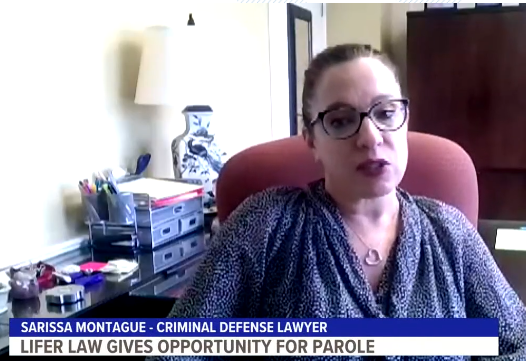
In an interview with WZZM 13 relating to Greg DuJardine, who is charged with being a habitual offender and attacking and sexually assaulting a woman in Port Sheldon Township earlier this month, Levine & Levine Criminal Defense Attorney Sarissa Montague explained that the Michigan Lifer Law doesn’t entitle someone serving life in prison a hearing.
“They are entitled to have their file reviewed, but that's not the same thing as having a hearing,” Montague said during her interview with WZZM 13.
On Sept. 8, DuJardine, 60, followed a woman as she drove south on US-31 from the Duncan Woods park in Grand Haven and then caused a crash, according to police. The woman told investigators that when she stopped in a gas station parking lot in Port Sheldon Township, believing he wanted to file a police report, DuJardine attacked and sexually assaulted her. She was injured but was able to fight him off and call 911.
DuJardine, who was on parole for a previous criminal sexual conduct conviction, was charged with second-degree criminal sexual conduct and being a habitual offender. Previously, DuJardine was convicted of Criminal Sexual Conduct – 1st Degree and pleaded guilty to a Habitual Offender charge in 1989 and served three decades of his life sentence. Before that conviction, DuJardine had also previously been convicted in 1981 in Ottawa County Circuit Court for Receiving and Concealing and in 1986 for Criminal Sexual Conduct in the Second Degree in Grand Haven Circuit Court. He was granted parole after a hearing conducted under the provisions of the Lifer Law on Nov. 2 of last year. He was released on parole on Jan. 9 of this year.
The Michigan Lifer Law allows certain people granted life sentences, like for Criminal Sexual Conduct or Armed Robbery, to be eligible for parole after a certain number of years served.
Montague explained a hearing doesn’t necessarily mean a person will be granted parole. She said after a hearing that doesn’t grant parole, that person’s file is reviewed every five years until the person is released or dies in prison.
“It's giving somebody a chance to be paroled. And whether or not someone gets pearled is sometimes reflective of the kind of running philosophy, for lack of better words, of the parole board,” she told WZZM 13. “Recently, the parole board has, has kind of thought life needs life, and so even though you are eligible for parole, doesn't necessarily mean that people get parole. However, that's not a standard rule. It just applies, you know, however, however they do to apply it.”
There are a lot of considerations that go into a Lifer Law hearing, and it varies on a case-by-case basis, according to Montague.
“What are they looking for? They're looking to see, has the person been rehabilitated? What have they done while they were in prison? Do they have a significant disciplinary history while in prison? What kind of classes did they take? What kind of jobs do they have? What kind of services. Have they completed? Do they help other people around them,” said Montague. “You know, all of the things that you're looking to see is this person safe to reenter into the community.”
Watch Sarissa Montague’s full interview, here.

